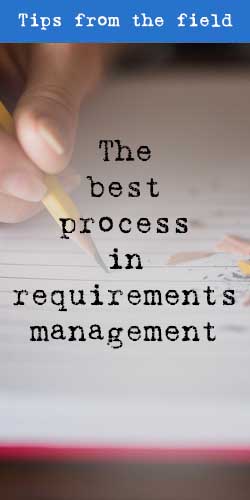What is IREB?
Smartpedia: The International Requirements Engineering Board (IREB ) is a non-profit organisation that establishes professional standards in requirements engineering.
IREB – professional standards in requirements engineering
The International Requirements Engineering Board – IREB for short – was founded in 2006. IREB pursues the goal of establishing professional standards in requirements engineering through training and further education. Similar to the International Institute of Business Analysis – IIBA for short – the IREB e.V. is also a non-profit organisation (e.V. stands for “registered association”). The board members are independent, international experts from industry, consulting, research and teaching.
IREB currently works with 122 training providers, 26 partner companies and 21 independent, certified examination centres. In order to be recognised as an IREB training provider, companies undertake to conduct training courses that are tailored to the IREB curriculum and are only conducted by CPRE-certified trainers. The IREB Partner Program is aimed at companies worldwide for which sound requirements engineering is important and whose employees wish to acquire the appropriate qualifications. Depending on the number of CPRE-certified employees, they can achieve three different partnership levels: Silver, Gold or Platinum.
IREB certificates
Since its foundation, IREB has developed into a recognised committee of experts for the personal certification of specialists in requirements engineering; more than 409,000 people in 75 countries have now passed the CPRE Foundation Level examination.
IREB currently offers following certifications:
- The Foundation Level addresses employees who are familiar with the terminology of requirements engineering, business analysis and requirements management as well as the corresponding notations and who have mastered basic techniques and methods.
- RE@agile is available in two versions: The RE@Agile Primer teaches techniques that are important and useful in the context of agile development. And with the Advanced Level RE@Agile these techniques are deepened.
- The Advanced Level is offered in four independent modules:
Requirements Elicitation (Techniques of the Foundation Level are deepened and extended in order to be able to collect requirements even more efficiently.)
Requirements Modeling (The correct use of graphical models to map functional requirements will be taught.)
Requirements Management (Methods and techniques for managing requirements of the entire product life cycle are learned.)
Advanced Level RE@Agile - The Expert Level is aimed at candidates who hold at least three CRPE Advanced Level certificates, have at least three years of practical experience as a requirements engineer and work as a trainer or coach in the field of RE.
For each level there is a defined and regulated examination procedure with practical examination questions.
Notes:
Here you can find an overview of IREB, the different certification levels, partnerships, etc.
Since 01.03.2022 there is a curriculum for the Digital Design Professional (DDP). Here you find a pro and cons for the new job description proposed by Bitkom e.V.
Here you can find additional information from our t2informatik Blog:


